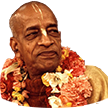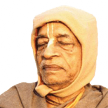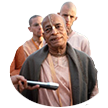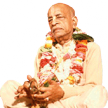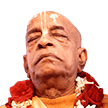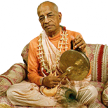Maha-bhagavata - an essential subject: Difference between revisions
(Created page with "Category:Essential Subjects <!----------------------- edit below this line -----------------------> <!------------------------ begin introduction text below --------------...") |
(Vanibot #0041: Moves Choose Another box to the end) |
||
| Line 2: | Line 2: | ||
<!----------------------- edit below this line -----------------------> | <!----------------------- edit below this line -----------------------> | ||
<!------------------------ begin introduction text below ------------------------> | <!------------------------ begin introduction text below ------------------------> | ||
The prākṛta, or third-class devotees, are temple worshipers without specific knowledge of the Lord and the Lord's devotees. The madhyama, or the second-class devotee, knows well the Lord, the Lord's devotees, the neophytes, and the nondevotees also. But the mahā-bhāgavata, or the first-class devotee, sees everything in relation with the Lord and the Lord present in everyone's relation. The mahā-bhāgavata, therefore, does not make any distinction, particularly between a devotee and nondevotee. Mahārāja Parīkṣit was such a mahā-bhāgavata devotee because he was initiated by a mahā-bhāgavata devotee, Śukadeva Gosvāmī. He was equally kind, even to the personality of Kali, and what to speak of others. | |||
Srila Prabhupada's books, lectures, conversations and letters offer a comprehensive presentation of this essential subject as seen in the Vaniquotes '''[[Vaniquotes:Category: | Srila Prabhupada's books, lectures, conversations and letters offer a comprehensive presentation of this essential subject as seen in the Vaniquotes '''[[Vaniquotes:Category:Maha-bhagavata|Maha-bhagavata]]''' category. An introduction from his books is given below in the following 8 quotes. | ||
<!-------- end introduction text and don't touch next three lines ---------> | <!-------- end introduction text and don't touch next three lines ---------> | ||
== Quotes from Srila Prabhupada's books == | == Quotes from Srila Prabhupada's books == | ||
<!----------------- edit quote boxes below this line -----------------> | <!----------------- edit quote boxes below this line -----------------> | ||
{{VaniQuotebox| | {{VaniQuotebox|A highly advanced maha-bhagavata devotee sees in this spirit: he sees the same Supersoul, Paramatma, existing within everyone's heart, regardless of discrimination based on the different material forms of the living entities|A highly advanced mahā-bhāgavata devotee sees in this spirit: he sees the same Supersoul, Paramātmā, existing within everyone's heart, regardless of discrimination based on the different material forms of the living entities. He sees everyone as part and parcel of the Supreme Personality of Godhead. The mahā-bhāgavata, who experiences the Supreme Godhead's presence everywhere, is never missing from the sight of the Supreme Lord, nor is the Supreme Lord ever lost from his sight. This is possible only when one is advanced in love of Godhead. '''(Śrīmad-Bhāgavatam 4.13.7)'''}} | ||
{{VaniQuotebox| | {{VaniQuotebox|A maha-bhagavata Vaisnava has the transcendental eyes to see who is sleeping under the spell of maya, and he engages himself in awakening sleeping conditioned beings by spreading the knowledge of Krsna consciousness|A mahā-bhāgavata Vaiṣṇava has the transcendental eyes to see who is sleeping under the spell of māyā, and he engages himself in awakening sleeping conditioned beings by spreading the knowledge of Kṛṣṇa consciousness. He opens eyes that are closed by forgetfulness of Kṛṣṇa. Thus the living entity is liberated from the dullness of material energy and is engaged fully in the service of the Lord. The madhyama-adhikārī Vaiṣṇava can awaken others to Kṛṣṇa consciousness and engage them in duties whereby they can advance. '''(Caitanya-caritāmṛta, Madhya-līlā 16.74)'''}} | ||
{{VaniQuotebox| | {{VaniQuotebox|A neophyte and an intermediate devotee should always be eager to hear the maha-bhagavata and serve him in every respect|Actually a mahā-bhāgavata is fit to spread Kṛṣṇa consciousness, but he does not distinguish where Kṛṣṇa consciousness should be spread from where it should not. He thinks that everyone is competent to accept Kṛṣṇa consciousness if the chance is provided. A neophyte and an intermediate devotee should always be eager to hear the mahā-bhāgavata and serve him in every respect. '''(Caitanya-caritāmṛta, Madhya-līlā 16.74)'''}} | ||
{{VaniQuotebox| | {{VaniQuotebox|Even a maha-bhagavata, or highly elevated devotee who has surrendered himself unto the lotus feet of Krsna, sometimes falls down from pure devotional service if he hears the Mayavada philosophy of the Sariraka-bhasya|The Māyāvāda commentary Śārīraka-bhāṣya is like poison for a Vaiṣṇava. It should not be touched at all. Śrīla Bhaktivinoda Ṭhākura remarks that even a mahā-bhāgavata, or highly elevated devotee who has surrendered himself unto the lotus feet of Kṛṣṇa, sometimes falls down from pure devotional service if he hears the Māyāvāda philosophy of the Śārīraka-bhāṣya. This commentary should therefore be shunned by all Vaiṣṇavas. '''(Caitanya-caritāmṛta, Antya-līlā 2.95)'''}} | ||
{{VaniQuotebox| | {{VaniQuotebox|He is the guru, or spiritual master, for the entire world, a devotee on the topmost platform, the maha-bhagavata stage, and a paramahamsa-thakura, a spiritual form only fit to be addressed as paramahamsa or thakura|A personality is kṛṣṇāliṅgita-vigraha—that is, he is always embraced by the Supreme Personality of Godhead, Kṛṣṇa. Such a person is above the considerations of the varṇāśrama institution. He is the guru, or spiritual master, for the entire world, a devotee on the topmost platform, the mahā-bhāgavata stage, and a paramahaṁsa-ṭhākura, a spiritual form only fit to be addressed as paramahaṁsa or ṭhākura. '''(Caitanya-caritāmṛta, Madhya-līlā 25.9)'''}} | ||
{{VaniQuotebox| | {{VaniQuotebox|Hiranyakasipu's last exploit would be to torment his own son Prahlada, who was a maha-bhagavata, an exalted Vaisnava. Then his life would end|Hiraṇyakaśipu's last exploit would be to torment his own son Prahlāda, who was a mahā-bhāgavata, an exalted Vaiṣṇava. Then his life would end. When the demigods were thus reassured by the Supreme Personality of Godhead, everyone was satisfied, knowing that the miseries inflicted upon them by Hiraṇyakaśipu would come to an end. '''(Śrīmad-Bhāgavatam 7.4 Summary)'''}} | ||
{{VaniQuotebox| | {{VaniQuotebox|Just as a materialistic person is always absorbed in thoughts of material gain, a maha-bhagavata like Prahlada Maharaja is always absorbed in thoughts of Krsna|For a small boy to give up playing is impossible, but Prahlāda Mahārāja, being situated in first-class devotional service, was always absorbed in a trance of Kṛṣṇa consciousness. Just as a materialistic person is always absorbed in thoughts of material gain, a mahā-bhāgavata like Prahlāda Mahārāja is always absorbed in thoughts of Kṛṣṇa. '''(Śrīmad-Bhāgavatam 7.4.37)'''}} | ||
{{VaniQuotebox| | {{VaniQuotebox|Maha-bhagavatas, or first-grade devotees, although moving amongst men, are not contaminated by honor or insult, hunger or satisfaction, sleep or wakefulness, which are all resultant actions of the three modes of material nature|The great six Gosvāmīs of Vṛndāvana all came from greatly rich and aristocratic families, but when they adopted the life of mendicants at Vṛndāvana, superficially they appeared to be in wretched conditions of life, but factually they were the richest of all in spiritual values. Such mahā-bhāgavatas, or first-grade devotees, although moving amongst men, are not contaminated by honor or insult, hunger or satisfaction, sleep or wakefulness, which are all resultant actions of the three modes of material nature. '''(Śrīmad-Bhāgavatam 1.11.38)'''}} | ||
<!----------------- edit quote boxes above this line -----------------> | <!----------------- edit quote boxes above this line -----------------> | ||
''' | '''Maha-bhagavata - [[Vaniquotes:Category:Maha-bhagavata|explore more within this category]]'''. | ||
{{EsentialSubjectTotal}} | {{EsentialSubjectTotal}} | ||
<div style="float:left;"> | |||
{{EssentialSubjectnav}} | |||
</div> | |||
__NOTOC__ | __NOTOC__ | ||
__NOEDITSECTION__ | __NOEDITSECTION__ | ||
Latest revision as of 16:46, 22 November 2020
The prākṛta, or third-class devotees, are temple worshipers without specific knowledge of the Lord and the Lord's devotees. The madhyama, or the second-class devotee, knows well the Lord, the Lord's devotees, the neophytes, and the nondevotees also. But the mahā-bhāgavata, or the first-class devotee, sees everything in relation with the Lord and the Lord present in everyone's relation. The mahā-bhāgavata, therefore, does not make any distinction, particularly between a devotee and nondevotee. Mahārāja Parīkṣit was such a mahā-bhāgavata devotee because he was initiated by a mahā-bhāgavata devotee, Śukadeva Gosvāmī. He was equally kind, even to the personality of Kali, and what to speak of others.
Srila Prabhupada's books, lectures, conversations and letters offer a comprehensive presentation of this essential subject as seen in the Vaniquotes Maha-bhagavata category. An introduction from his books is given below in the following 8 quotes.
Quotes from Srila Prabhupada's books
Maha-bhagavata - explore more within this category.
Vanipedia has now over 903 introductory articles compiled from Srila Prabhupada's books under the series titled Essential Subjects. All these articles can be seen in the Table of Content on the right side of this article and also here in this Umbrella Category. Browse through them to relish the breadth and depth of Srila Prabhupada's teachings - There is a subject for everyone.
